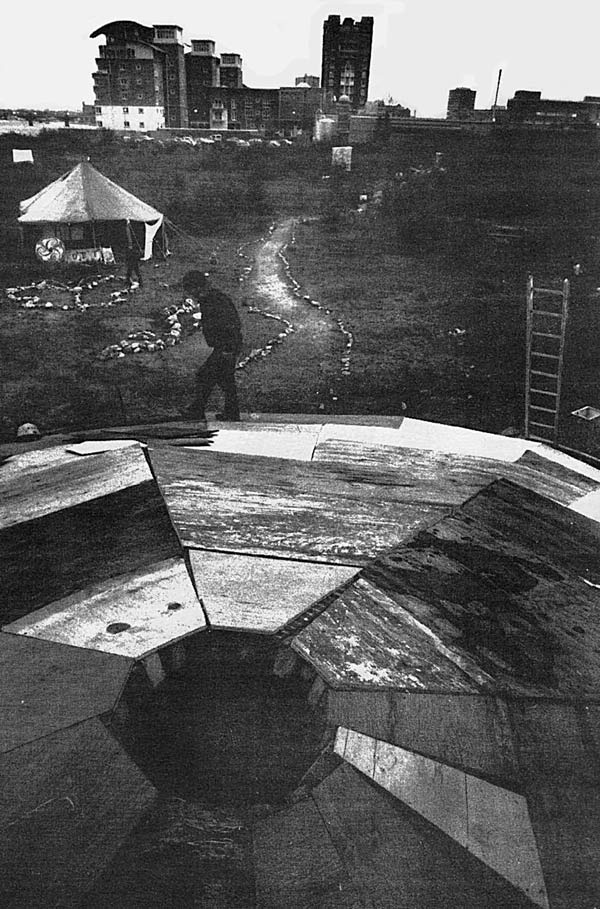
Aggracultural Trespass
Thousands of acres lie empty in our cities waiting for supermarkets, luxury flats and business parks. In May, 500 activists reclaimed a portion.
Squall 13, Summer 1996, pg. 32.
Almost immediately after arriving on 13.5 acres of prime but derelict urban wasteland, 500 activists began transforming the skyline.
Yurts, benders, solar showers, an octagonal wooden meeting place and a geodesic dome took their place amongst the surrounding angular architecture - and created something a little different to the earmarked supermarket and luxury flats.
In the seven years since Guinness bought the site, fronting the River Thames in Wandsworth, South London, it has lain empty.

The activists were drawing attention to the number of similarly abused sites in the country. Five per cent of London alone is wasteland - an area the size of Westminster Borough.
Meanwhile 600,000 people have no home and the green belt is eaten away.
The occupation, began on Sunday May 5, marking the fiftieth anniversary of the largest squatting movement this country has seen. In 1946 thousands of homeless demobilised servicemen reclaimed their empty barracks, moved in their families, and forced the then (Labour) government to act.
Wandsworth was not chosen by accident, although such was the organisation that, come any problems, the occupation could have ended up in any one of four alternative venues.
Key organiser Ernest Rodker, a Wandsworth resident and campaigner for 24 years, (who spent most of the first day building a compost toilet) told Squall that Wandsworth sees itself in the “vanguard of efficiency”.
This, he explained, means keeping the council tax low at the expense of grants, services, open spaces and community facilities.
The flagship Tory council has raised £500 million from selling property, flats and land (including a popular city farm two years ago that still lies derelict) and pumped the lot into keeping their council tax amongst the lowest in the country.
“For a hundred years or more there were warehouses along here where local people worked but who never saw the river or had a view,” he said. “The factories go and they get an area not open to the public and houses they can’t afford.” For now at least, this area is open to the public and the land reclaimed.

Related Articles
Poverty Knocks - Jim Paton renders a forceful reply to those who would have us believe we live in a country run as a meritocracy where poverty is only a degree of relative affluence - Squall 13, Summer 1996
50th Anniversaries - And All That - 50 years after VE Day, and therefore 50 years of the post-war squatting movement in Britain. By Jim Paton - Squall 10, Summer 1995
